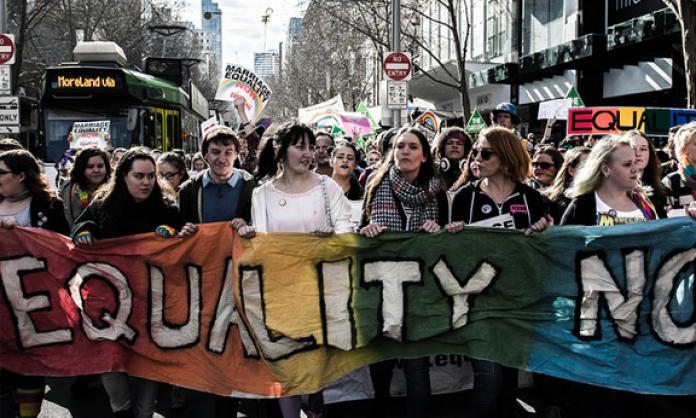The marriage equality campaign is facing its most important fight yet.
In less than four weeks, approximately 16 million people will be asked if they support marriage rights being extended to all. It is essential that the “yes” campaign demolish the reactionary “no” side.
The farcical postal survey is not the means by which equality advocates wanted this issue resolved. Quite the opposite: it is the preferred method of the right wing of the Liberal Party and its backers in the ultraconservative Australian Christian Lobby. The voluntary postal vote is their best hope to stymie reform because it sidelines young people and favours the right’s older, more highly motivated, constituency.
It’s up to us to prove them wrong. To stand by or boycott would be self-defeating. We need a mass campaign that draws on the enormous support that already exists for equality, and that takes the “yes” message into every workplace, school, university campus and community group. Immediately, this means making sure every sympathiser is on the electoral roll and able to vote. Beyond that, it means ensuring that our side is proactive in mobilising a “yes” vote to secure a resounding victory.
The number of organisations that have so far thrown their weight behind the “yes” campaign is extremely positive. Even the ALP seems to have temporarily discarded its sanitised talking point safety blanket in favour of some old-fashioned tub thumping in favour of equality. Numerous unions have also made a political stand early in the campaign.
Indeed, on the same day Turnbull and Michaelia Cash were giving a press conference about cracking down on supposed union thuggery, the unions were busy expressing their support on social media for the right of people to love each other free from discrimination, a position the Liberal Party has proven unable to accommodate into its anti-worker, divide-and-rule, money-grubbing world view.
This is hardly a surprise: the workers’ movement has always relied on solidarity and collective action to make gains against the wealthy and powerful, while the right has championed competition, individual success and divide-and-rule wedge politics. The battle lines being drawn in this way has begun to broaden the perception of this campaign from one primarily concerning LGBTI people to one of broader civil rights, hostility to conservatism and class consciousness. This is an enormous source of strength for the “yes” side.
So while the aim of the right was to use this fight to whip up a reactionary panic about the degradation of society’s core conservative ruling institution, it may find that it has unwittingly united a broad liberal left coalition around a basic civil and human rights issue. Its craven refusal to accept the inevitable in relation to marriage rights has politicised individuals and organisations that might otherwise have remained passive.
This politicisation is an immensely positive thing. It has the potential not just to draw in a wide range of forces behind support for the civil rights of LGBTI people, but to forge a keener understanding of and hostility to the right’s broader agenda of division, hate and persecution of all those who deviate from traditional values and social convention.
The active defence of those who don’t conform to the traditional family can lead to a greater sympathy with all who fall foul of the conservative powers that be – such as those who disrespect borders as they flee persecution or those labelled terrorists or racially vilified because of who they are.
The formation of groups such as Muslims for Marriage Equality immediately following the announcement of the postal vote is a small indication of how these bonds of solidarity can begin to emerge. This can have positive long term effects on political consciousness and the ability of the right to impose its reactionary agenda across the board.
This campaign represents a welcome break from the tedious veneration of compromise and worship of middle-groundism. Society is being plunged into battle; two clear sides are taking shape and traditional antagonisms are once again coming to the fore. LGBTI people, and by extension all those marginalised and persecuted, are learning who they can rely on for support and solidarity and who they cannot.
The key organisations and institutions of society are being tested. Will they stand on the side of solidarity, civil rights and equality? Or will they give open or tacit endorsement to those attempting to cling to reaction and bigotry?
It is incumbent on all supporters of social justice to do our bit for the “yes” campaign in whatever capacity we can.









